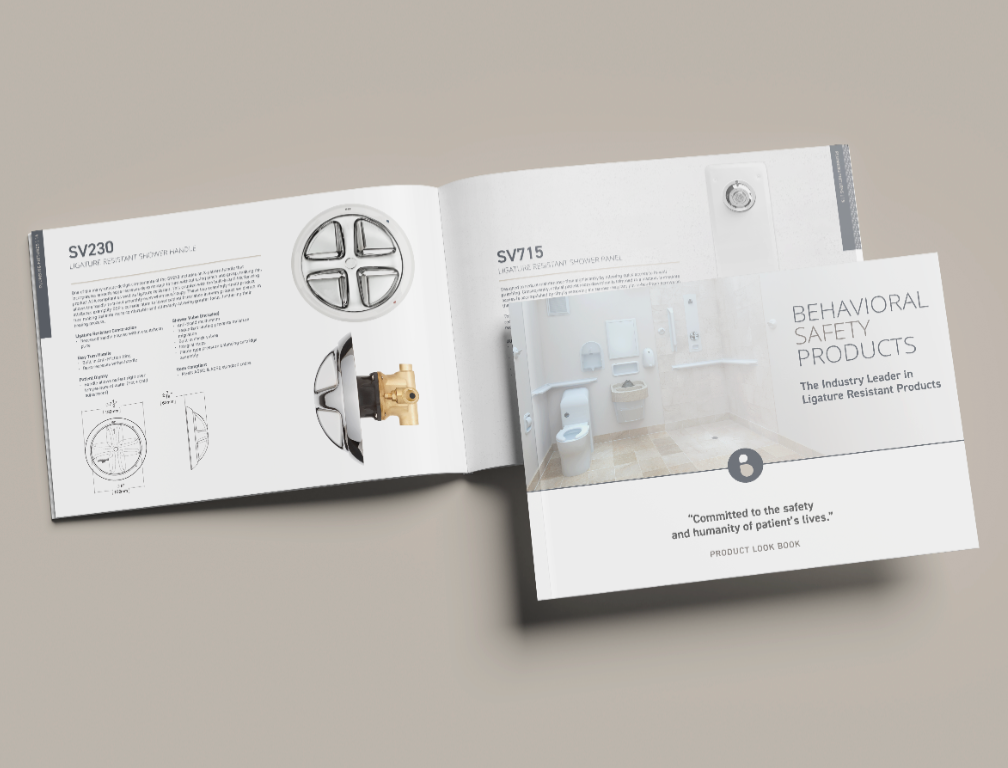FAQ
DON'T USE
Your content goes here. Edit or remove this text inline or in the module Content settings. You can also style every aspect of this content in the module Design settings and even apply custom CSS to this text in the module Advanced settings.
What is a ligature point?
A ligature point is an item or feature in an environment that can be used to be used in combination to create a strangulation tool in order to cut off blood supply to one’s brain, particularly for the purpose of suicide. Ligature points pose a threat to patients, especially in behavioral healthcare settings.
What is anti-ligature?
The term anti-ligature is a misnomer within the healthcare community as nothing can be fully ligature-free. However, “ligature resistance” signifies that an item or fixture has been specifically designed with patient safety & well-being in mind. More definitively, designed without points where a cord, rope, bedsheet, shoelace, or other fabric/material can be looped, tied, or wedged to create a substantial point of attachment/tension that may result in self-harm or the loss of life of a patient. The primary function of any ligature resistant products or anti-ligature fixtures is to prevent patients from using the said item as a means to inflict harm on themselves or others.
What are ligature resistant products?
Ligature resistant products have components that remove ligature points, helping prevent suicide by strangulation. A ligature resistant product lessens the ability of fixtures for the purpose of suicide or strangulation in behavioral healthcare facilities.
Is suicide an issue for behavioral healthcare patients?
Yes, suicide remains an issue in healthcare settings for patients. 70% of suicides occur through using a ligature point in the patient’s bathroom, bedroom, or closet (The Joint Commission).
What are the mental illnesses most associated with suicide?
Common mental illnesses such as depression, substance abuse disorders, and psychotic disorders are highly linked to suicide. Make sure to take a look at BSP’s “How To Recognize Signs of Mental Health Issues” to explore some of the common signs to look for and how to reach out to help yourself or a loved one.
Is it possible for a patient room to be ligature-free or suicide-free?
Although the goal is to create patient rooms as safe as possible while providing a calming and aesthetically pleasing environment for patients, it is virtually impossible to design an environment that is entirely secure and free of risk, technically, ligature-free or suicide-free. No matter how well designed and constructed, the built environment cannot be relied upon as an absolute preventative measure. The Joint Commission states that “It is not possible to remove all potential ligature risk points.” Much like the term anti-ligature, ligature-free and suicide-free are misnomers and imply that no incidents can occur. According to the New York State Office of Mental Health’s Patient Safety Standards, Materials, and Systems Guidelines, “Staff awareness of the environment, the latent risks of that environment, and the behavior risks and needs of the patients served in that environment are absolutely essential. Different organizations and different patient populations will require greater or lesser tolerance for risk.”
How can ligature resistant safety products aid in suicide prevention?
Ligature resistant safety products aid in suicide prevention by limiting the ligature points in a behavioral hospital, specifically the patient bedroom and bathroom. This allows facility staff the assurance that patients are safe in their designated area in the healthcare facility.
Where can ligature resistant safety products be used?
Typically, ligature resistant safety products are used in behavioral, mental, and psychiatric healthcare facilities. For these facilities, ligature resistant safety products should be installed in patient bathrooms, closets, bedrooms, and common areas where patients congregate. These healthcare facilities have an increased responsibility to ensure an environment is safe from any ligature points for suicide attempts.
Are ligature resistant safety products supposed to be used only in behavioral healthcare hospitals?
Ligature resistant safety products can be used in any facility where patients may be a danger to themselves or others. These can include behavioral healthcare hospitals, emergency departments, medical or surgical units, and outpatient facilities. The Joint Commission indicates that 14.25% of suicides occur in the nonbehavioral units of general hospitals, such as medical or surgical units. These suicides are viewed as the most preventable because they occur near staff.
Do emergency departments and medical or surgical units need to meet the same standards as behavioral and psychiatric units?
Though emergency departments are not required to meet the same standards as an inpatient psychiatric unit to be a ligature resistant environment, the spaces or rooms designated for treating patients with behavioral health conditions within an emergency department must meet the ligature resistant requirements. Patients in emergency departments often require equipment to monitor and treat their medical conditions, so making their environment truly ligature resistant is impossible. However, organizations must implement safeguards to keep patients with active suicidality safe during treatment in that setting. The organization or design team should first consider state rules and regulations (this is typically regulated by each state health department).
What does it mean for a product to be abuse-resistant?
Products that are considered abuse-resistant are constructed with sturdy, reliable, and durable materials such as impact-resistant polycarbonate and aircraft-grade aluminum. Products categorized as abuse-resistant are designed to keep patients from breaking or tampering with fixtures or accessories for self-harm or harming others. Materials like those mentioned above are utilized in many of Behavioral Safety’s products, such as our SD750 Soap Dispenser, the TM260 Thermostat Cover, the PH235 Paper Towel Dispenser, and our TR230 Toilet Paper Dispenser.
How can a product be tamper-proof?
Tamper-proof products are intended to discourage and prevent any aspect of manipulation, alteration, removal, interference with, or destruction by patients, manually or by tools, makeshift or otherwise. Tamper-proof fixtures or accessories should be installed with tamper-resistant stainless steel screws to prevent patients from disassembling or removing said fixtures. Behavioral Safety includes tamper-resistant screws with their products. We also recommend the use of pick-free caulk around the perimeter of products to deter further tampering.
How can a product be shatterproof?
Much to the same degree as abuse-resistant products, shatterproof products are constructed of sturdy, reliable, and durable materials to prevent the item from breaking or shattering. A broken or cracked item can produce sharp objects or shards, used for patient self-harm or as a weapon against facility staff. Behavioral Safety’s products are constructed with shatterproof materials such as polycarbonate, aircraft-grade aluminum, or stainless steel for strength and durability.
Why choose Behavioral Safety Products’ suicide and ligature resistant products?
Behavioral Safety Products offers ligature resistant products for every room that a patient will be in throughout the day. Some of BSP’s products include ligature resistant shower heads or panels, sinks, faucets, toilets, grab bars, paper towel dispensers, mirrors, TV enclosures, and more. BSP seeks to serve as a single source of suicide prevention safety products for the behavioral-psychiatric industry, assisting facilities in providing the highest degree of safety, functionality, and aesthetically pleasing environments for patients.
What sets Behavioral Safety Products apart in the behavioral healthcare industry?
With its 45+ years of experience in the behavioral healthcare industry, Behavioral Safety Products has an unwavering commitment to never compromise when it comes to the safety or humanity of patients’ lives. Our passion is to save patients’ lives, while improving the quality of their environment. With its field experience, BSP is at the forefront of the behavioral industry, specializing in designing exclusive ligature resistant building products. We work with facilities, architects, and engineers to be front-runners in problem-solving as new safety issues arise. BSP also provides rapid access to critical products as facilities face steady increases in patient acuity and greater difficulty in patient monitoring. BSP equips customers with an integration of engineering input, product support, and knowledge from field experience that will assist any facility.

Explore Our Latest Innovations
Explore our comprehensive product catalog, featuring industry-leading ligature-resistant solutions designed for safety, durability, and compliance. From ligature-resistant fixtures to innovative hygiene solutions, our products help create secure environments in behavioral healthcare and other high-risk settings.
Our Partners















